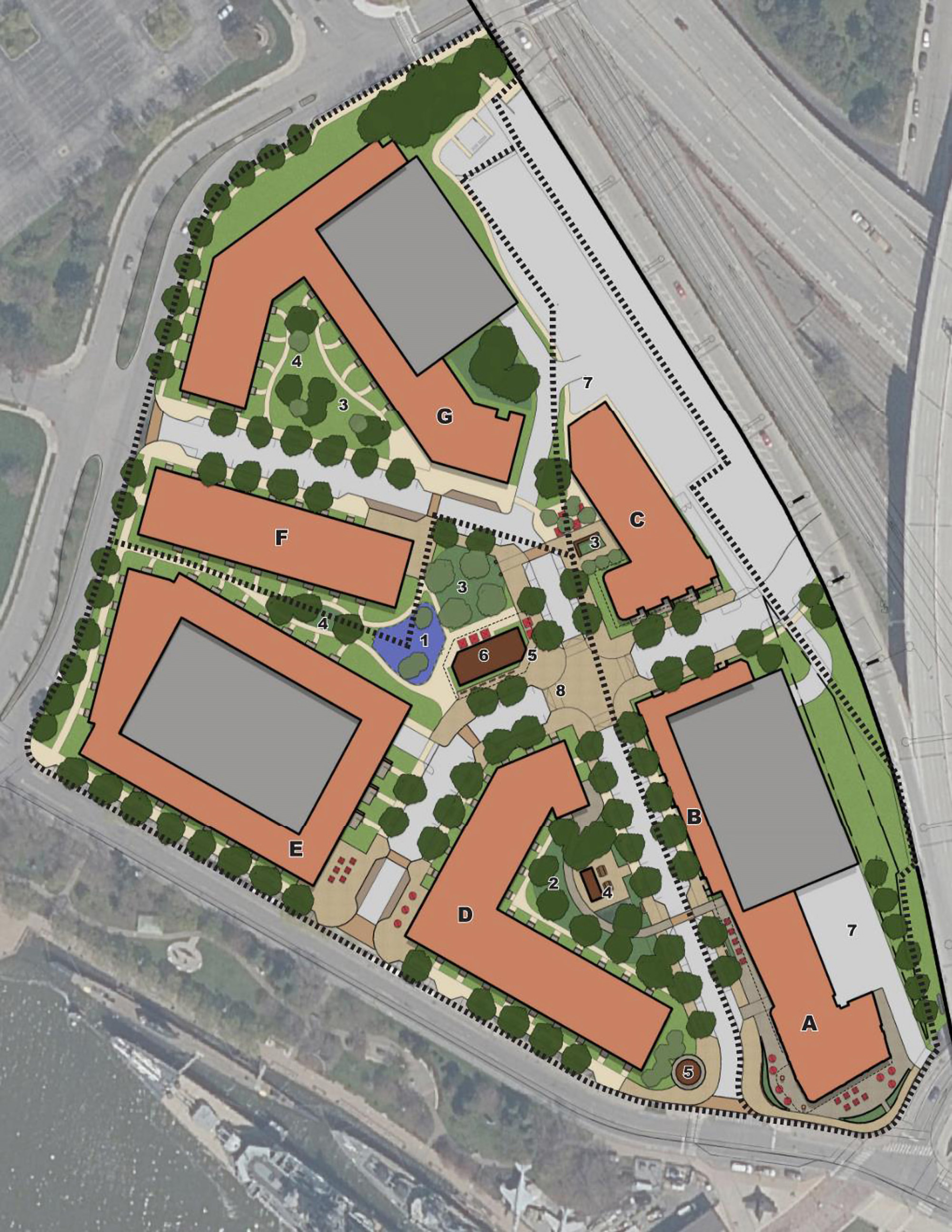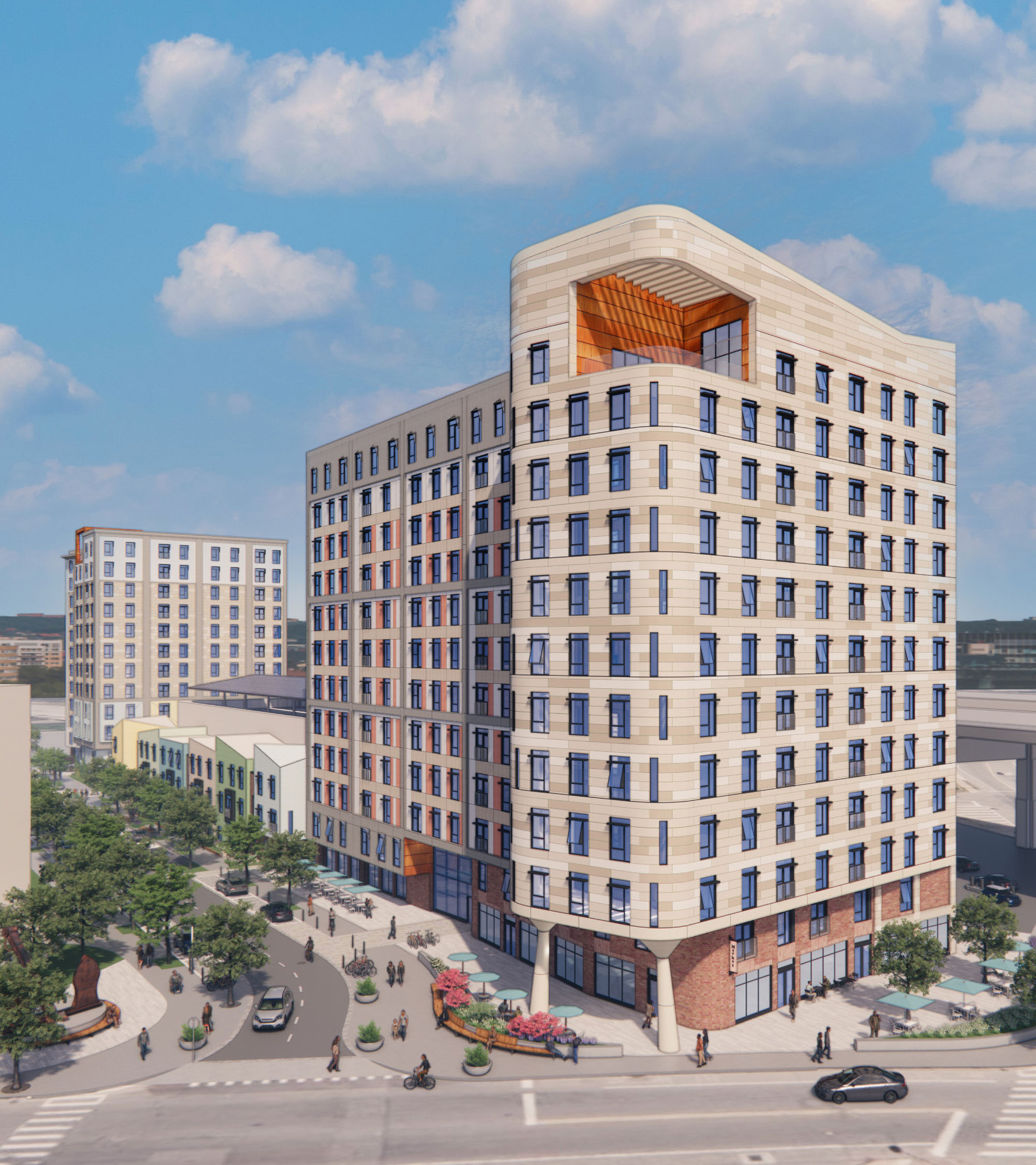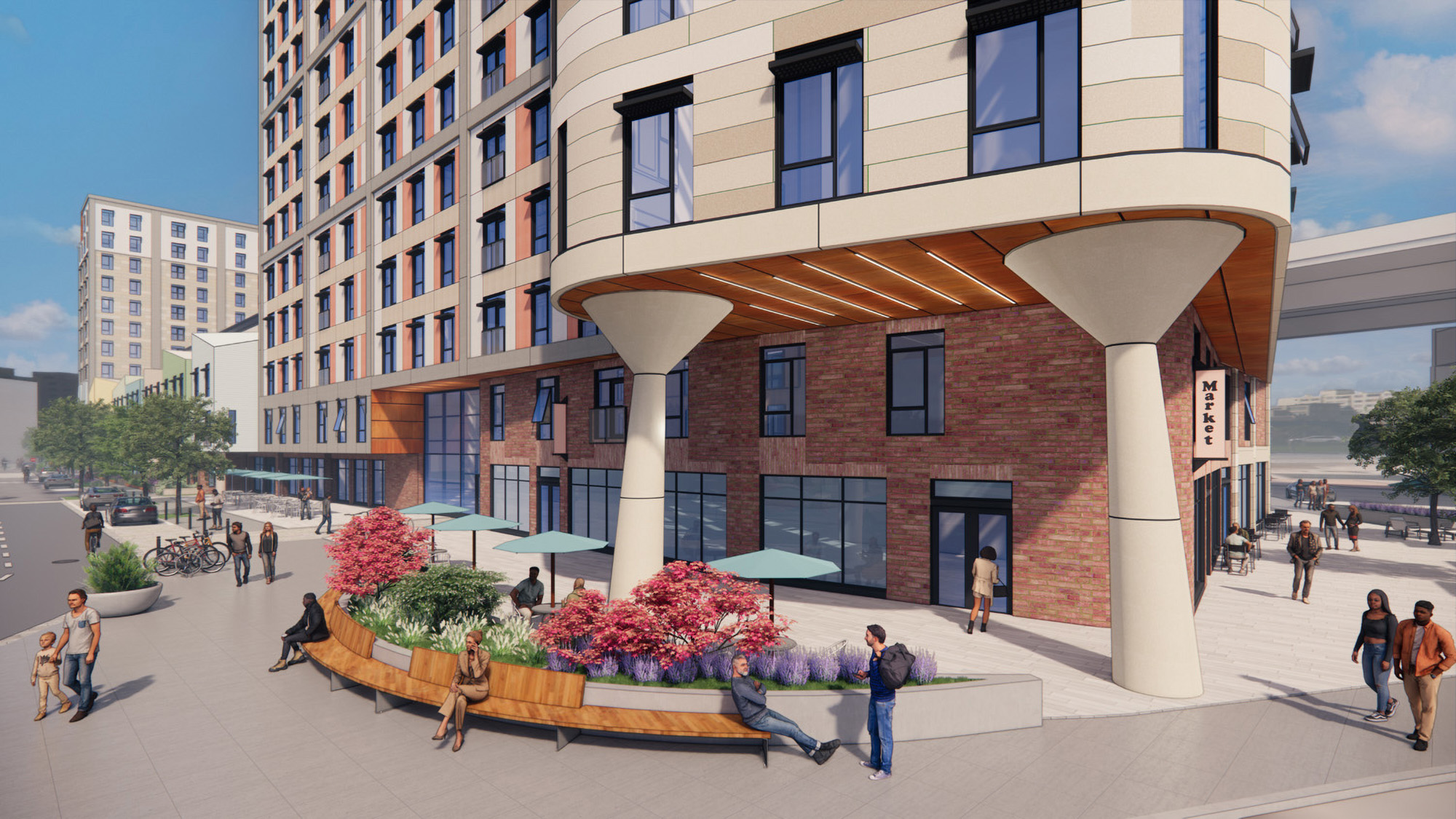Chicago-based Habitat, a leading U.S. multifamily developer and property manager, announced that its $400 million redevelopment of Marine Drive Apartments in Buffalo, N.Y., has received planned unit development (PUD) approval by the Buffalo Common Council, paving the way for the affordable housing project to become reality. The equitable transit-oriented development (ETOD), a joint venture with real estate firm Duvernay + Brooks and the Buffalo Municipal Housing Authority (BHMA), will include approximately 700 apartment units across multiple buildings, making it one of the largest affordable redevelopments in the city’s history.
Located along the city’s waterfront and a short distance from the Erie Canal Harbor Metro Rail station, the current community at 205 Marine Drive comprises 616 units across seven 12-story towers. Built more than 70 years ago, the complex has fallen into disrepair in recent years, necessitating replacement of the structures.
Affordable Housing Community: Marine Drive Apartments
Phase one of redeveloping Marine Drive Apartments includes building a mix of new towers on the surface parking lot adjacent to its current buildings. The 300,000-sf phase one complex will comprise low-, mid- and high-rise buildings, a parking garage and commercial space. The phased development approach will allow residents to move directly into the new properties from their current apartments without being displaced. Phase one is expected to break ground in late 2024.
“We have been overwhelmed by the tremendous support citywide for a new Marine Drive, which expands much-needed affordable housing in the area and keeps current residents in the place many have called home for several decades,” said Jeff Head, Vice President of Development, Habitat Affordable Group. “The site has historic significance dating back to Buffalo’s earliest days as a commercial center and offers convenience to employment, recreation and entertainment options downtown and easy access to other parts of the city via the light rail and interstate.”

An exhaustive feasibility study of the current Marine Drive towers, which were completed in 1952, determined that replacing the existing buildings with new, modern housing made the most economic sense as it would be less expensive than a complete rehab of the current structures, which are all in need of new building systems, windows, facades, and roofs.
To help inform decisions about the new Marine Drive, the property’s current residents were heavily involved in the community feedback process through a series of private planning meetings and town hall forums with the developers. Habitat recently released two videos, “Community Interaction” and “Rebuild Over Rehab,” highlighting the project scope and community involvement that helped bring the project to fruition.
“I am extremely excited, especially for the fact that the new Marine Drive buildings will be ADA accessible, which will greatly improve the quality of life for my daughter who is living with a disability,” said Barbara Aviles, who has been a Marine Drive resident since 2007. “The neighborhood is a beautiful place to live, with so much to do in the area like restaurants, roller skating, the waterfront, and it’s convenient to get to work using the bus system and train. I am grateful the developers and BMHA took feedback from residents, as it feels like we are getting a lot of what we asked for, especially in the layouts of our living room and bedrooms.”
With the PUD now approved, the Marine Drive development team is focused on getting final design approval from the city and filing financing applications with the state of New York by the end of 2023. The project is anticipated to be completed by 2029.

Habitat is working on a similar ETOD in Chicago’s historic Bronzeville neighborhood called 43 Green. The first of three mixed-use, mixed-income properties, which are adjacent to the Chicago Transit Authority’s 43rd Street Green Line L station, opened to residents this past summer, with 43 Green’s second building expected to top off by the end of the year. Upon completion, the $100 million project will bring approximately 300 new apartments to the area.
For more information on Marine Drive, visit www.engagetheteam.com/marinedrive.
About Habitat:
Founded in 1971, Habitat is a full-service residential real estate company specializing in property management, acquisitions and development. One of the largest residential property developers and managers in the United States, with over $3 billion in assets and more than 16,000 units under management across six states, the company’s portfolio spans a range of property types, from mid- and high-rise condominium, apartment and adaptive reuse developments to senior and affordable housing communities. Headquartered in Chicago, with more than 800 employees throughout the United States, Habitat is dedicated to improving the communities it serves through innovation and a commitment to excellence. For more information, visit www.habitat.com.
Related Stories
Multifamily Housing | Jun 29, 2023
5 ways to rethink the future of multifamily development and design
The Gensler Research Institute’s investigation into the residential experience indicates a need for fresh perspectives on residential design and development, challenging norms, and raising the bar.
Affordable Housing | Jun 27, 2023
Racial bias concerns prompt lawmakers to ask HUD to ban biometric surveillance, including facial recognition
Two members of the U.S. House of Representative have asked the Department of Housing and Urban Development to end the use of biometric technology, including facial recognition, for surveillance purposes in public housing.
Apartments | Jun 27, 2023
Average U.S. apartment rent reached all-time high in May, at $1,716
Multifamily rents continued to increase through the first half of 2023, despite challenges for the sector and continuing economic uncertainty. But job growth has remained robust and new households keep forming, creating apartment demand and ongoing rent growth. The average U.S. apartment rent reached an all-time high of $1,716 in May.
Urban Planning | Jun 15, 2023
Arizona limits housing projects in Phoenix area over groundwater supply concerns
Arizona will no longer grant certifications for new residential developments in Phoenix, it’s largest city, due to concerns over groundwater supply. The announcement indicates that the Phoenix area, currently the nation’s fastest-growing region in terms of population growth, will not be able to sustain its rapid growth because of limited freshwater resources.
Multifamily Housing | Jun 15, 2023
Alliance of Pittsburgh building owners slashes carbon emissions by 45%
The Pittsburgh 2030 District, an alliance of property owners in the Pittsburgh area, says that it has reduced carbon emissions by 44.8% below baseline. Begun in 2012 under the guidance of the Green Building Alliance (GBA), the Pittsburgh 2030 District encompasses more than 86 million sf of space within 556 buildings.
Industry Research | Jun 15, 2023
Exurbs and emerging suburbs having fastest population growth, says Cushman & Wakefield
Recently released county and metro-level population growth data by the U.S. Census Bureau shows that the fastest growing areas are found in exurbs and emerging suburbs.
Mixed-Use | Jun 6, 2023
Public-private partnerships crucial to central business district revitalization
Central Business Districts are under pressure to keep themselves relevant as they face competition from new, vibrant mixed-use neighborhoods emerging across the world’s largest cities.
Multifamily Housing | Jun 6, 2023
Minnesota expected to adopt building code that would cut energy use by 80%
Minnesota Gov. Tim Walz is expected to soon sign a bill that would change the state’s commercial building code so that new structures would use 80% less energy when compared to a 2004 baseline standard. The legislation aims for full implementation of the new code by 2036.
Multifamily Housing | Jun 1, 2023
Income-based electric bills spark debate on whether they would harm or hurt EV and heat pump adoption
Starting in 2024, the electric bills of most Californians could be based not only on how much power they use, but also on how much money they make. Those who have higher incomes would pay more; those with lower incomes would see their electric bills decline - a concept known as income-based electric bills.
Multifamily Housing | May 30, 2023
Boston’s new stretch code requires new multifamily structures to meet Passive House building requirements
Phius certifications are expected to become more common as states and cities boost green building standards. The City of Boston recently adopted Massachusetts’s so-called opt-in building code, a set of sustainability standards that goes beyond the standard state code.


















